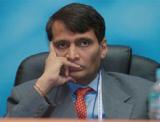New Delhi, Jan 17: Railway finances are in "deep trouble", according to Railway Minister Suresh Prabhu who observed today that the government behemoth has been caught in a "vicious circle" of poor investments compromising its services.
 Pitching for increased investment into the Railways, he said Pension Fund could be one of the possible means of pumping in the money into the largest government transporter which is facing losses to the tune of thousands of crores.
Pitching for increased investment into the Railways, he said Pension Fund could be one of the possible means of pumping in the money into the largest government transporter which is facing losses to the tune of thousands of crores.
He said the Railways can become an engine of growth in the coming years and contribute 2.5 per cent to three per cent in the GDP with an improved infrastructure.
However, the Railway finances are in "deep trouble", the Minister said addressing the Economic Times Global Business Summit here.
While underlining that railways requires huge investments to expand its network to provide physical connectivity, he said that 30 to 40,000 km of lines need to be expanded to carry more cargo besides people.
He regretted that India does not have the required institutions to invest in such sectors.
Pension fund, he said, was one such possibility which could help pump investments.
Giving the example of Naxal-hit areas, Prabhu said besides carrying security personnel, a better railway infrastructure could bring more investments in such places and create job opportunities.
Successive governments have been of the view that jobs can wean away youth from naxalism and militancy.
Referring to Prime Minister Narendra Modi's aim of taking the economy to USD 20 trillion from USD 2 trillion, he said policies which are ambitious and at the same time "doable" can help achieve the target.
Terming lack of physical infrastructure as a "road block", Prabhu said many things have to be put in order to achieve the desired growth levels.
He said after setting targets, there was a a need to put in place a strategy to achieve the objectives and the Modi government was working on it.






Comments
Add new comment